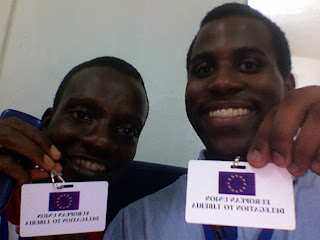It's about time for an update, isn't it? While on winter break from law school, I can now turn my attention to closing out this blog.
For Liberia to change for the better, Liberians need to make the change. This aligns with Rebuild Africa's goal for sustainable development, and I saw firsthand the reason for this mission. Innumerable voices have entered the country, especially since the end of the civil war. Almost all ideas sound good. Let's give notebooks to kindergartners. Let's supply locals with malaria-prevention nets. Let's send used doodads. But during my time in Monrovia, I saw UN-donated notebooks on sale in a market; my co-workers said that they refuse to use malaria-prevention nets; and street vendors sell used foreign goods at marked-up prices to unsuspecting Westerners. Given unwanted items, citizens either discard them or turn them into something profitable. By saying this, I don't mean to imply that people should not continue to give (by all means, many necessary organizations exist solely because of generous donations). Instead, I say this to encourage non-Liberians to realize that Liberians should have a say in the matter.
When Liberians do have a say, wonders happen. For example, Rebuild Africa has employed Liberians to build additions to schools, train future leaders, and facilitate the healing process that endures years after the most recent war ended. Rather than focusing on the immediate yet ostensible pay-off (e.g., the picture-perfect moment of delivering dozens of notebooks to a classroom full of students), I would argue that teaching and paying locals to build classrooms will have a much more enduring and meaningful effect.
Seeing these principles of sustainable development succeed on a local level, I would think that they should work on a macro level as well. By investing in comprehensively training and supporting Liberian workers (especially young college graduates), multinational corporations would probably get a better product as well as continue the economic growth of the country. This could hold true for Chevron, a recent investor in the potentially oil-rich depths of the Atlantic near Liberia. Aside from the obvious PR benefits of building human capital, companies may yield a higher profit.
So, you can add my opining to the host of others who have thrown in their two cents. But I will close by reflecting on the culture and racial climate that I observed. Though Liberia has a unique connection with the United States (a connection that few Americans know about but that every Liberian knows about), seeing Liberians deify America and its culture saddened me-- largely because them doing so often meant that they denigrated their own beautiful, complex, and rich culture. Also, as a Black American, I thought Liberians missed the mark when they disparaged their government (which, mind you, probably should receive a decent amount of criticism) and people but then delusively referred to the conditions of rich, fortunate, and prospering Black Americans. I don't know if I ever communicated effectively that for every Black American featured on the BBC radio or on CNN.com, nine others typically live in a decidedly worse condition (Bob Herbert wrote about this extensively for the New York Times). Comparing countries and people will likely only lead to division, especially when those comparisons rest on illusion.
Liberians, individually and en masse, should look within. I witnessed their strength, honor, and vigor. By faith, their country-- led by its countrymen and women-- will flourish.














